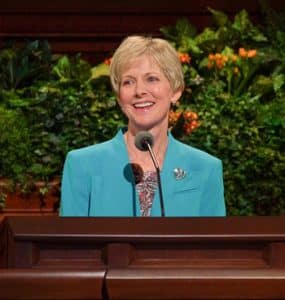I am not sure why this message at first struck a negative chord with me, but it did. Probably something to do with the idea of New Year’s resolutions—that as an Exemplar- I needed to resolve to be exactly like Christ. For me, this is a sure way in which I am doomed to fail. My thought that Christ is perfect, so He set a perfect example for me, so I need to be perfect, Right? But I am not perfect. Not even close. And I get depressed, distressed, and even angry thinking about how I perceive this message to be something that is obligating me to constantly try to be perfect….
To be true, the actual words, and certainly the spirit of the message do not reflect this flawed and failing ideology. Yet, I did not feel encouraged by the words included in the message. They state that we are supposed to be somehow inspired to “follow in Christ’s footsteps” and “become the kind of people the Lord wants us to be…” (which made me think, “isn’t He, of all beings, supposed to love me for who I am? Does He really not ‘want’ me as I am?” Does Christ… actually not want me?)
So I was in a stupor, trying to feel inspired somehow about the message. Lo and behold, with the holidays, I have been catching up on some of my favourite podcasts, including BYU Free Speeches on iTunes, which is a collection of BYU devotionals. Specifically, I listened to BYU President, Cecil O. Samuelson, give a speech titled “Failure and Success.” This speech made me think about the concept of perfection, and what it means to follow the example of Christ. Like many church speeches and resources, Samuelson’s speech disappointingly only uses examples of males. He discusses the concept of success as seen through a typically masculine lens, which is to say, he includes (male only) heroes of sports, government, and church history as examples. Putting this aside, I tried to focus on his message. His oration included reminders of the failures encountered by these men, much more than it includes details of their success. It included a reminder that we are judged by Christ in terms that are fair, and applied to us individually.
I allowed this idea to sit with me for a time. I thought of the women who I thought would have have made the speech more relevant and important to me. I thought of Harriet Tubman, born into slavery, and who suffered life-long seizures as a result of being hit on the skull with a metal weight. Yet she worked passionately on the Underground Railroad, even becoming the first American female to lead a military expedition in the American Civil War (she was even buried with military honours!). She was not perfect, her life was not perfect, yet she did all she could to accomplish the work she understood to be personal revelation from God.
I thought more on this, and considered Sariah, the mother of Nephi. It seems to me that her failing is the  thing that is most noted in scripture. Her lack of faith caused her to murmur against God as she feared for her sons’ lives. At first glance, it seems Sariah is only included as a cautionary tale, reminding us that murmuring against God, a lack of faith, and motherly mortal instinct that overrides instruction from God is a grievous sin akin to never being forgiven, as it is recorded in scripture for all to know. And yet…. It really is a story of Atonement. Because in Lehi’s later vision, Sariah partakes of the fruit. This means she was forgiven of her imperfection — and regardless of her past sins, regardless of the choices of her sons, she was forgiven, accepted, and acknowledged by God. In this vision given to Lehi, Sariah is in a position of righteousness, as one who sought and partook of the precious fruit. Her story is not a cautionary tale as much as it is a story of Atonement.
thing that is most noted in scripture. Her lack of faith caused her to murmur against God as she feared for her sons’ lives. At first glance, it seems Sariah is only included as a cautionary tale, reminding us that murmuring against God, a lack of faith, and motherly mortal instinct that overrides instruction from God is a grievous sin akin to never being forgiven, as it is recorded in scripture for all to know. And yet…. It really is a story of Atonement. Because in Lehi’s later vision, Sariah partakes of the fruit. This means she was forgiven of her imperfection — and regardless of her past sins, regardless of the choices of her sons, she was forgiven, accepted, and acknowledged by God. In this vision given to Lehi, Sariah is in a position of righteousness, as one who sought and partook of the precious fruit. Her story is not a cautionary tale as much as it is a story of Atonement.
As I pondered on the lives of these women, I read the scriptural section of this month’s message. In this section, this scripture stood out the most was this:
Alma 17:11; And the Lord said unto them also: Go forth among the Lamanites, thy brethren, and establish my word; yet ye shall be patient in long-suffering and afflictions, that ye may show forth good examples unto them in me, and I will make an instrument of thee in my hands unto the salvation of many souls.
Patient and long-suffering struck me, because for me, it applies to my imperfections. I need to be patient with myself as I develop and grow in the spirit and otherwise.
Though I felt better about the message in applying this ideas—I was still troubled. After all, I am a visiting teacher—how do I teach this? How do I encourage the women I visit teach to seek to follow the example of Christ, without coming across as impersonal—or worse, judgmental?
Chieko to the rescue!
“I’m not going to tell you to read the scriptures, fast and pray, keep the commandments, attend the temple, and attend your meetings as ways of coming to know Christ. We all know that those things are important. All of them will improve and strengthen our relationship with the Savior, but they are not the relationship itself, and sometimes we forget that. The relationship I am talking about is a sense of presence, a scense of companionship, a sense of closeness. It’s a relationship not with an idea or a historical image but with a living individual. When we have the feeling of the Savior as a real person, there’s a new awareness of what it means to take His name upon us, almost in being clothed in His name, of seeing with His eyes and of feeling His work being done with our hands.”
– Chieko Okazaki, Aloha! 1995, p67.
In t his spirit, I found freedom, enlightenment and encouragement. In this, the message for me turned. It was no longer telling me that I needed to be perfect and I needed to tell the women I visit teach to follow an impossibly perfect example. It was telling me that all I need to do, and what I aim to teach—is that when we forge a personal relationship with Christ, then He can direct us to do His work. It is not about me being perfect. It is about me being willing to do Christ’s work in my mortal, imperfect, forgivable state. It means I need to try. And it is more than okay if I am not perfect.
his spirit, I found freedom, enlightenment and encouragement. In this, the message for me turned. It was no longer telling me that I needed to be perfect and I needed to tell the women I visit teach to follow an impossibly perfect example. It was telling me that all I need to do, and what I aim to teach—is that when we forge a personal relationship with Christ, then He can direct us to do His work. It is not about me being perfect. It is about me being willing to do Christ’s work in my mortal, imperfect, forgivable state. It means I need to try. And it is more than okay if I am not perfect.
So I offer no challenge or resolution for you at the start of 2014. Instead, I invite you to open yourself to Christ, in the singular way that you, and only you can. That is all; and that is perfection.
Do you have any spiritual goals for 2014?






One Response
You said exactly what I didn’t know I was looking for! Thanks!